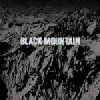 Ostensibly, the critique is the SesameStreet simplicity with which pop hits are made. But the song soundslike a remix of Jonathan Richman's "Roadrunner" with Albert Aylerlaying down some free-spirited saxophone in the background. So thequestion becomes whether the modern music abhorrent to McBean and hisBlack Mountain is the pop stuff or the other stuff. Neither we nor theband ruminates very long on that question before "Don't Run Our HeartsAround" wanders off in a direction hinted at at the end of "ModernMusic." The song resonates with the contusive sound of Black Sabbathand Blue Cheer: deep sludgy metal guitars with psychedelic overtonesenough to leave one bruised. The guitars on this song and throughoutthe album have a wonderfully primitive growl and aggressiveness. It isan altogether different blackness than the first song, but perhaps oneintentionally conjured by the band's name. The song's dynamics areeffective and ecstatic. It oscillates from jam session to quietcampfire sing-along to serenade to a final intense and fiery tornado ofsound and metal. There is no sense of balance in "Don't Run Our HeartsAround" but the instability is invigorating. After the misty drearinessof "Druganaut" (inspired song title; less inspiring music andperplexingly released as a 12"), the playful romp of the minilithic "NoSatisfaction" pays the Rolling Stones some proper homage. McBean'svocals are not overly deep but still soulful; most of the songs employbackground vocals (his own, plus other band members). The femalebacking vocals are especially remarkable for extracting the moreelusive tones and textures in Black Mountain's songs. "No Hits" offersa forceful drumbeat and rollicking tempo combined with electronic soundsamples, chanted vocals (chanted to the point of ceremonialincantation), and that same squawky saxophone, admittedly a pastiche ofstuff you might dredge up in the East River. In fact, the whole albumis a pastiche of styles. Even within the songs there are frequent andsometimes halting transitions between parts. A consistent tone isenough to bind a Black Mountain song together and sometimes the tone isall that does. "Heart of Snow" begins as a gentle guitar and voicedirge (this is the first time that Amber Webber's vocals are theunquestionably lead) and is then bridged by a dual guitar and pianopart, expanding into a freedom rock interlude, back to dirge, untilfinally dirge and freedom rock combine to create something almosttriumphant. All the while, the tone is the glue and the cohesion forthe song. The album's closer, "Faulty Times," has some indulgentkeyboard segments which nauseatingly recall The Doors, but some morethoughtful parts of the 8-minute song are able to rescue Black Mountainfrom one ill-advised allusion and perilous misstep on the band'splayful ascent.
Ostensibly, the critique is the SesameStreet simplicity with which pop hits are made. But the song soundslike a remix of Jonathan Richman's "Roadrunner" with Albert Aylerlaying down some free-spirited saxophone in the background. So thequestion becomes whether the modern music abhorrent to McBean and hisBlack Mountain is the pop stuff or the other stuff. Neither we nor theband ruminates very long on that question before "Don't Run Our HeartsAround" wanders off in a direction hinted at at the end of "ModernMusic." The song resonates with the contusive sound of Black Sabbathand Blue Cheer: deep sludgy metal guitars with psychedelic overtonesenough to leave one bruised. The guitars on this song and throughoutthe album have a wonderfully primitive growl and aggressiveness. It isan altogether different blackness than the first song, but perhaps oneintentionally conjured by the band's name. The song's dynamics areeffective and ecstatic. It oscillates from jam session to quietcampfire sing-along to serenade to a final intense and fiery tornado ofsound and metal. There is no sense of balance in "Don't Run Our HeartsAround" but the instability is invigorating. After the misty drearinessof "Druganaut" (inspired song title; less inspiring music andperplexingly released as a 12"), the playful romp of the minilithic "NoSatisfaction" pays the Rolling Stones some proper homage. McBean'svocals are not overly deep but still soulful; most of the songs employbackground vocals (his own, plus other band members). The femalebacking vocals are especially remarkable for extracting the moreelusive tones and textures in Black Mountain's songs. "No Hits" offersa forceful drumbeat and rollicking tempo combined with electronic soundsamples, chanted vocals (chanted to the point of ceremonialincantation), and that same squawky saxophone, admittedly a pastiche ofstuff you might dredge up in the East River. In fact, the whole albumis a pastiche of styles. Even within the songs there are frequent andsometimes halting transitions between parts. A consistent tone isenough to bind a Black Mountain song together and sometimes the tone isall that does. "Heart of Snow" begins as a gentle guitar and voicedirge (this is the first time that Amber Webber's vocals are theunquestionably lead) and is then bridged by a dual guitar and pianopart, expanding into a freedom rock interlude, back to dirge, untilfinally dirge and freedom rock combine to create something almosttriumphant. All the while, the tone is the glue and the cohesion forthe song. The album's closer, "Faulty Times," has some indulgentkeyboard segments which nauseatingly recall The Doors, but some morethoughtful parts of the 8-minute song are able to rescue Black Mountainfrom one ill-advised allusion and perilous misstep on the band'splayful ascent. samples:
Read More

